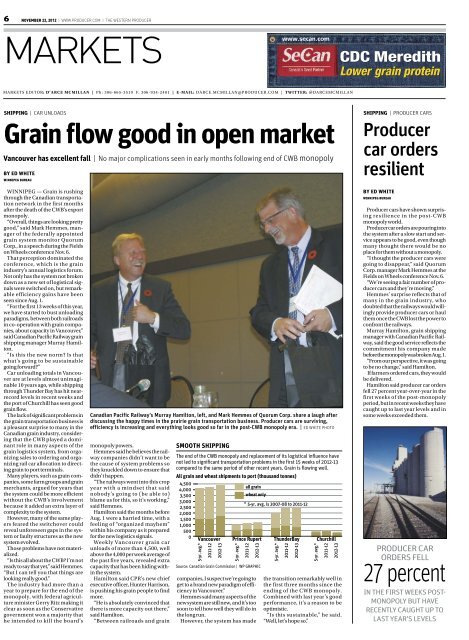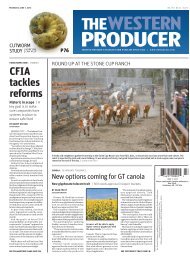Barn boss a referee and coach - The Western Producer
Barn boss a referee and coach - The Western Producer
Barn boss a referee and coach - The Western Producer
Create successful ePaper yourself
Turn your PDF publications into a flip-book with our unique Google optimized e-Paper software.
6<br />
BY ED WHITE<br />
WINNIPEG BUREAU<br />
NOVEMBER 22, 2012 | WWW.PRODUCER.COM | THE WESTERN PRODUCER<br />
MARKETS<br />
MARKETS EDITOR: D’ARCE MCMILLAN | Ph: 306-665-3519 F: 306-934-2401 | E-MAIL: DARCE.MCMILLAN@PRODUCER.COM | TWITTER: @DARCEMCMILLAN<br />
SHIPPING | CAR UNLOADS<br />
WINNIPEG — Grain is rushing<br />
through the Canadian transportation<br />
network in the first months<br />
after the death of the CWB’s export<br />
monopoly.<br />
“Overall, things are looking pretty<br />
good,” said Mark Hemmes, manager<br />
of the federally appointed<br />
grain system monitor Quorum<br />
Corp., in a speech during the Fields<br />
on Wheels conference Nov. 6.<br />
That perception dominated the<br />
conference, which is the grain<br />
industry’s annual logistics forum.<br />
Not only has the system not broken<br />
down as a new set of logistical signals<br />
were switched on, but remarkable<br />
efficiency gains have been<br />
seen since Aug. 1.<br />
“For the first 13 weeks of this year,<br />
we have started to bust unloading<br />
paradigms, between both railroads<br />
in co-operation with grain companies,<br />
about capacity in Vancouver,”<br />
said Canadian Pacific Railway grain<br />
shipping manager Murray Hamilton.<br />
“Is this the new norm? Is that<br />
what’s going to be sustainable<br />
going forward?”<br />
Car unloading totals in Vancouver<br />
are at levels almost unimaginable<br />
10 years ago, while shipping<br />
through Thunder Bay has hit nearrecord<br />
levels in recent weeks <strong>and</strong><br />
the port of Churchill has seen good<br />
grain flow.<br />
<strong>The</strong> lack of significant problems in<br />
the grain transportation business is<br />
a pleasant surprise to many in the<br />
Canadian grain industry, considering<br />
that the CWB played a dominant<br />
role in many aspects of the<br />
grain logistics system, from organizing<br />
sales to ordering <strong>and</strong> organizing<br />
rail car allocation to directing<br />
grain to port terminals.<br />
Many players, such as grain companies,<br />
some farm groups <strong>and</strong> grain<br />
merchants, argued for years that<br />
the system could be more efficient<br />
without the CWB’s involvement<br />
because it added an extra layer of<br />
complexity to the system.<br />
However, many of the same players<br />
feared the switchover could<br />
reveal unforeseen gaps in the system<br />
or faulty structures as the new<br />
system evolved.<br />
Those problems have not materialized.<br />
“Is this all about the CWB? I’m not<br />
ready to say that yet,” said Hemmes.<br />
“But I can tell you that things are<br />
looking really good.”<br />
<strong>The</strong> industry had more than a<br />
year to prepare for the end of the<br />
monopoly, with federal agriculture<br />
minister Gerry Ritz making it<br />
clear as soon as the Conservative<br />
government won a majority that<br />
he intended to kill the board’s<br />
monopoly powers.<br />
Hemmes said he believes the railway<br />
companies didn’t want to be<br />
the cause of system problems so<br />
they knuckled down to ensure that<br />
didn’t happen.<br />
“<strong>The</strong> railways went into this crop<br />
year with a mindset that said<br />
nobody’s going to (be able to)<br />
blame us for this, so it’s working,”<br />
said Hemmes.<br />
Hamilton said the months before<br />
Aug. 1 were a harried time, with a<br />
feeling of “organized mayhem”<br />
within his company as it prepared<br />
for the new logistics signals.<br />
Weekly Vancouver grain car<br />
unloads of more than 4,500, well<br />
above the 4,000 per week average of<br />
the past five years, revealed extra<br />
capacity that has been hiding within<br />
the system.<br />
Hamilton said CPR’s new chief<br />
executive officer, Hunter Harrison,<br />
is pushing his grain people to find<br />
more.<br />
“He is absolutely convinced that<br />
there is more capacity out there,”<br />
said Hamilton.<br />
“Between railroads <strong>and</strong> grain<br />
SMOOTH SHIPPING<br />
<strong>The</strong> end of the CWB monopoly <strong>and</strong> replacement of its logistical influence have<br />
not led to significant transportation problems in the first 15 weeks of 2012-13<br />
compared to the same period of other recent years. Grain is flowing well.<br />
All grain <strong>and</strong> wheat shipments to port (thous<strong>and</strong> tonnes)<br />
4,500<br />
4,000<br />
all grain<br />
3,500<br />
wheat only<br />
3,000<br />
2,500<br />
2,000<br />
1,500<br />
1,000<br />
500<br />
* 5-yr. avg. is 2007-08 to 2011-12<br />
0<br />
Vancouver Prince Rupert ThunderBay Churchill<br />
5-yr. avg.*<br />
2011-12<br />
2012-13<br />
5-yr. avg.*<br />
2011-12<br />
2012-13<br />
Source: Canadian Grain Commission | WP GRAPHIC<br />
companies, I suspect we’re going to<br />
get to a br<strong>and</strong> new paradigm of efficiency<br />
in Vancouver.”<br />
Hemmes said many aspects of the<br />
new system are still new, <strong>and</strong> it’s too<br />
soon to tell how well they will do in<br />
the long run.<br />
However, the system has made<br />
5-yr. avg.*<br />
www.secan.com<br />
Grain flow good in open market<br />
Vancouver has excellent fall | No major complications seen in early months following end of CWB monopoly<br />
Canadian Pacific Railway’s Murray Hamilton, left, <strong>and</strong> Mark Hemmes of Quorum Corp. share a laugh after<br />
discussing the happy times in the prairie grain transportation business. <strong>Producer</strong> cars are surviving,<br />
efficiency is increasing <strong>and</strong> everything looks good so far in the post-CWB monopoly era. | ED WHITE PHOTO<br />
2011-12<br />
2012-13<br />
5-yr. avg.*<br />
2011-12<br />
2012-13<br />
the transition remarkably well in<br />
the first three months since the<br />
ending of the CWB monopoly.<br />
Combined with last year’s good<br />
performance, it’s a reason to be<br />
optimistic.<br />
“Is this sustainable,” he said.<br />
“Well, let’s hope so.”<br />
CDC Meredith<br />
Lower Lower grain grain protein<br />
protein<br />
SHIPPING | PRODUCER CARS<br />
<strong>Producer</strong><br />
car orders<br />
resilient<br />
BY ED WHITE<br />
WINNIPEG BUREAU<br />
<strong>Producer</strong> cars have shown surprising<br />
resilience in the post-CWB<br />
monopoly world.<br />
<strong>Producer</strong> car orders are pouring into<br />
the system after a slow start <strong>and</strong> service<br />
appears to be good, even though<br />
many thought there would be no<br />
place for them without a monopoly.<br />
“I thought the producer cars were<br />
going to disappear,” said Quorum<br />
Corp. manager Mark Hemmes at the<br />
Fields on Wheels conference Nov. 6.<br />
“We’re seeing a fair number of producer<br />
cars <strong>and</strong> they’re moving.”<br />
Hemmes’ surprise reflects that of<br />
many in the grain industry, who<br />
doubted that the railways would willingly<br />
provide producer cars or haul<br />
them once the CWB lost the power to<br />
confront the railways.<br />
Murray Hamilton, grain shipping<br />
manager with Canadian Pacific Railway,<br />
said the good service reflects the<br />
commitment his company made<br />
before the monopoly was broken Aug. 1.<br />
“From our perspective, it was going<br />
to be no change,” said Hamilton.<br />
If farmers ordered cars, they would<br />
be delivered.<br />
Hamilton said producer car orders<br />
fell 27 percent year-over-year in the<br />
first weeks of the post-monopoly<br />
period, but in recent weeks they have<br />
caught up to last year levels <strong>and</strong> in<br />
some weeks exceeded them.<br />
PRODUCER CAR<br />
ORDERS FELL<br />
27 percent<br />
IN THE FIRST WEEKS POST-<br />
MONOPOLY BUT HAVE<br />
RECENTLY CAUGHT UP TO<br />
LAST YEAR’S LEVELS








